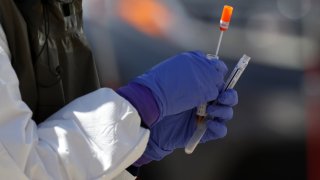
Citing concerns about grieving families uncertain about whether the coronavirus played a role in a loved one's death, the Los Angeles County Board of Supervisors Tuesday approved a plan for more COVID-19 testing by the coroner's office.
Supervisor Hilda Solis recommended ramping up testing and suggested the possibility of a website or phone line where families could seek guidance on whether a recently deceased person could be tested.
"My office has heard from families who have been left wondering if their loved ones passed away from COVID-19. Without any options for testing, many families are left without answers,'' Solis said in a statement issued after the board's vote. "In these cases, family members may not know if they have been exposed to the coronavirus.''
Solis said more testing might help uncover important clues about the spread of the virus and help with contact tracing.
"In this pandemic, many people who fell ill stayed home and died at home to avoid local hospitals overwhelmed with COVID-19 patients,'' Solis said.
The motion directs the medical examiner-coroner to work with county attorneys and health department authorities to develop criteria for who could be tested and protocols for those tests. Solis envisions making tests available in cases even when the coroner would not otherwise be asked to take jurisdiction.
The number of deaths in the U.S. this year is in excess of historical trends even after considering deaths from the coronavirus, leading some experts to speculate that COVID-19 fatalities are being undercounted.
The first COVID-19 death to be confirmed was on Feb. 28 in Washington state. However, postmortem results later revealed that a 57-year-old San Jose woman, who had appeared to die of a massive heart attack, died of the virus on Feb. 6.
"Counting only confirmed or probable COVID-19-associated deaths … likely underestimates the number of deaths attributable to the pandemic,'' according to the U.S. Centers for Disease Control and Prevention.
However, in its own April report of excess deaths, the federal health agency warned that the increase could also be due to a spike in deaths related to suicides, drug overdoses or heart disease, for example.
A cause of death can sometimes be difficult to determine when someone dies at home or shortly after arriving at an emergency room. The proximate cause may be subject to interpretation when other factors, such as heart disease or pneumonia, play a role.
COVID-19 itself can present many different symptoms. While the most common seem to be respiratory problems, there are also reports of younger people dying of strokes and heart attacks without respiratory symptoms, who tested positive for the virus.
The CDC recommends that unless an autopsy is being done, a nasal swab -- like those for living patients -- be used to test for COVID-19. Fewer precautions are actually necessary for health care workers conducting the test, given that the virus typically spreads through coughing or sneezing. However, the CDC still advises that health care workers use gloves, gowns and masks form protection when conducting postmortem tests.
Autopsies of suspected COVID-19 cases can be more dangerous and should be performed in a negative pressure isolation room using higher-grade personal protective equipment to comply with the CDC guidelines.
A report is expected back in two weeks.



